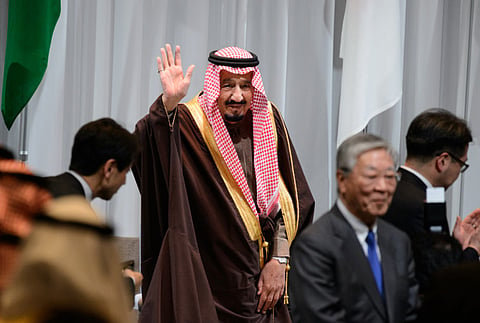Spreading canards serve little purpose
Saudi Arabia faces extremism just like every other contemporary society — something that King Salman hopes to confront head-on at home and elsewhere

As rumours go, this one is a dozy, so fantastic that one can only shake one’s head. For reasons that are nearly impossible to fathom, critics of the Kingdom of Saudi Arabia circulated news that Riyadh was getting ready to purchase the Maldives — lock, stock and barrel. This went beyond routine investments in specific economic sectors, or even the foreign aid variety that meant to foster closer ties between the two countries. It was of another dimension altogether, and when King Salman Bin Abdul Aziz cancelled his planned stop in the Maldives towards the end of his Asian tour, anti-Saudi and anti-Arab diatribes filled the airwaves, opinion pages and, of course, the blogosphere where irrelevance rules.
Beyond the “Maldives Question”, sycophants focused on the Saudi monarch’s travel retenue — over a thousand individuals, several hundred tonnes of luggage, an electric elevator for the monarch to descend from his plane [one commentator remarked that the elevator was “golden” and that the plane was “private”] — as if these represented substantive issues.
One wonders when this silliness will stop? When a monarch travels, his court goes with him, and on multi-country trips, advance parties hop ahead for security reasons. This means that a duplicate set-up must be in place to welcome him and, at the completion of a visit, everyone and everything must be accounted for before the baton is passed to the next station. Perhaps those who spread anti-Saudi venom do not realise it, but heads-of-states all over the world fly on private planes and, except for a few Scandinavian countries, no leader flies coach or books seats on low-cost airlines.
Of course, concentrating on silliness intends to diminish the value of what the Saudi ruler’s Asian tour is supposed to represent that, to put it mildly, has now taken on a particularly ugly feature because some assumed and continue to believe that King Salman was on a proselytising tour.
To be sure, Malaysia, Indonesia, Brunei and even China include large Muslim populations, where Saudi soft-power efforts can add value to Sunni Muslim perspectives ostensibly to counter the potential appeal represented by Iran. Only Japan is spared this comparison, although the visit to Tokyo was nothing but successful. Riyadh signed a variety of economic agreements with the Japanese government, and while it is still not entirely clear on which Stock Exchange the upcoming Saudi Aramco will be placed, Japanese Prime Minister Shinzo Abe certainly pitched the merits of his capital city’s financial platform. Both sides committed themselves to a variety of joint economic investment opportunities that promise to be equally rewarding in the years and decades to come.
Still, the conclusion that the Saudi initiatives were meant to foster intolerance of the “other”, are thoroughly wrong, even if hugely entertaining. They are not, repeat, are not anti-Shiite and they do not foster sectarianism, and they certainly do not intend to roll back basic freedoms that exist in the countries visited by the monarch. To say otherwise is simply silly. Riyadh aims to unite Muslims as much as possible even if this is easier said than done. Even with China, whose “One Belt, One Road” initiative may be interpreted as a hegemonic or even a sectarian platform, the kingdom aspires to cooperate with Beijing rather than confront it along religious lines.
If Malay or Brunei rulers strengthen their respective legitimacies through sustained public piety and a defence of Islamic values, Saudi Arabia can only rejoice. If Malay and Brunei officials enhance their credentials by associating themselves with the Custodian of the Two Holy Mosques, King Salman can only express his delight, without expecting anything in return.
Towards that end, and to prove his point, King Salman met leading Muslim clerics, including a few that were not favourably disposed towards Unitarian (Wahhabi) teaching in Indonesia, including Nahdlatul Ulama. Minions concluded that the Javanese cajoled the Saudi, though it behooves us to also opine that maybe, just maybe, the Arab softened the rigidity of the Indonesians if for no other reason than to encourage tolerance.
It is worth recalling that King Salman’s predecessor, late King Abdullah Bin Abdul Aziz, had reached out to other Muslim schools of thought as well as other faiths, when he sponsored the establishment of the King Abdullah Bin Abdul Aziz International Centre for Interreligious and Intercultural Dialogue in Vienna. In the words of the late Prince Saud Al Faisal, who represented the ruler at the 2012 inauguration in Austria, the purpose of the Centre was “to bring people and cultures closer and deepen the values of moderation and tolerance”. Prince Saud did not say that Riyadh wished to coax or entice on the basis of religious solidarity to exert control and impose conservative values. What was true then is applicable today.
Saudi Arabia faces extremism just like every other contemporary society, something that King Salman hoped to confront head-on at home and elsewhere. Short of buying countries, its only hope to succeed is in persuading as many governments and nations as possible that victory will neither come by promoting conservatism or by imposing itself on every common norms. Rather, the way out is through heightened tolerance, notwithstanding propagandist rhetoric that aims to divide.
Dr Joseph A. Kechichian is the author of the just-published The Attempt to Uproot Sunni Arab Influence: A Geo-Strategic Analysis of the Western, Israeli and Iranian Quest for Domination (Sussex: 2017).



